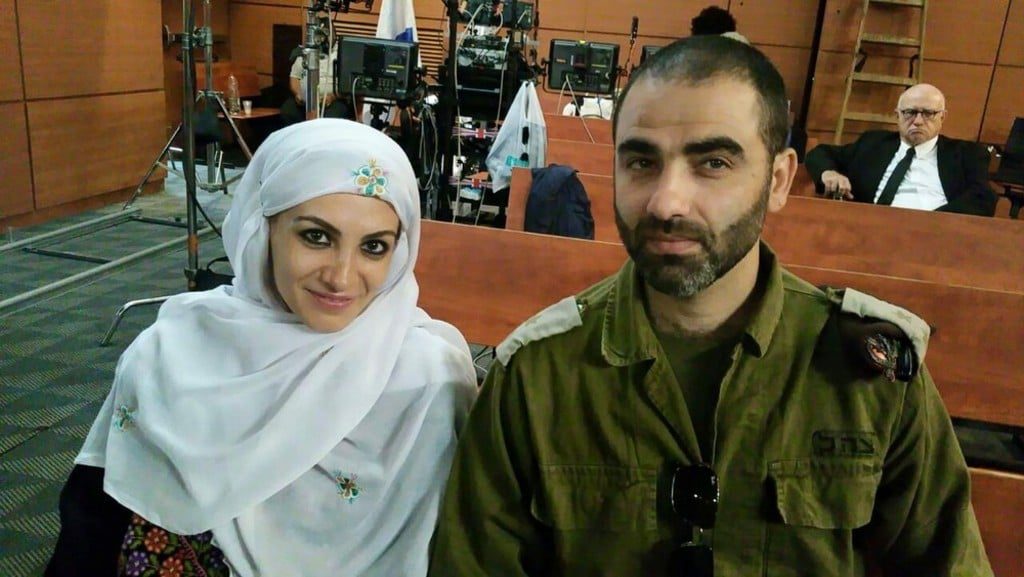
When Hanan Hillo (35) does not receive the large Americano she asked for, she winks at the waitress. In a short conversation in Arabic, the girl apologizes. Hillo laughs. “I worked here myself before I was an actress. They are good girls.”
The location is Fattoush, an intriguing restaurant in the Israeli city of Haifa, where countless small rooms provide the costumers with a sense of privacy. A large banner of the famous Lebanese singer Fairuz dominates the wall. Although Hillo’s star is still on the rise, now and then during the conversation she has to shake a hand or say hello. The Palestinian-Israeli actress was one of the leads in the critically acclaimed Israeli drama series Fauda, so many people in Israel know her. Her thick curls might mislead some potential admirers, though: in the series, she wears a headscarf.
Fauda (‘Chaos’), the first season of which aired in Israel in 2015, attracted international attention in 2016, when it was picked up by Netflix. The second season is currently in production. Fauda follows a special unit of Israeli commandos, the so-called mustaribeen, who learn Arabic and infiltrate deep into Palestinian society. Their goal is to hunt down the notorious Palestinian Hamas fighter Abu Ahmad. The series was praised for its nuanced depiction of Palestinians and for its use of the Palestinian dialect among the Israeli characters, who exhibit an impressive mastery of the language of “their enemies.”
Hillo plays Nasrin Hamed, Abu Ahmad’s wife. Normally an actress in Palestinian theatre and television productions, it was the first time Hillo agreed to appear in an Israeli series. “What I like about Fauda is the fact that there are no good or bad guys. It doesn’t involve stereotypes about Palestinian society. See, for example, the story of a Palestinian suicide bomber. The series explains that the Israelis killed her fiancé on their wedding day. So the attack doesn’t come out of nowhere. You see Palestinians living in very difficult situations. They too love their families. They want to live.”
In one remarkable scene, Hillo’s child keeps asking for the “Jewish teddy bear” they were given by an Israeli man who helped the family to flee. “Making that scene was terrible,” Hillo laughs. “We were filming at a train station. I had to put the teddy bear down somewhere, but every time I did, all the train passengers ran away because they thought it was a bomb. I was seriously afraid I would get shot by Israeli troops.”
It would not be the first time Hillo has felt afraid in her own country. During the many Palestinian knife attacks in 2015 and 2016, she did not feel safe speaking Arabic on the streets of Haifa, she says. “I was afraid people would think I was a terrorist. I even spoke Hebrew to my kids when I picked them up from school. It was only afterwards that I thought: why did I do that?”
Her example is typical of what it means to live in a society where Palestinians are regarded as second-class citizens. This starts at a young age: Palestinian schools receive a smaller budget than their Jewish counterparts. “For example, there was no drama class at our school. There was no money for anything extra,” says Hillo.
She supplements her actress’ salary by writing plays and starring in them. She is currently on tour with a production about women in Palestinian culture. “It’s about men who don’t do anything, but also about sex and politics.” Hillo has performed the play dozens of times, for example in Haifa, in the Druze town Majdal al-Shams in the Israeli-occupied Golan Heights, in Ramallah, the de facto capital of the Israeli-occupied West Bank, and in the conservative Palestinian-Israeli city Umm al-Fahm. “There, we leave out the parts about sex and religion. You can’t imagine what it’s like for a Palestinian woman to talk about sex in public.”
Hillo’s writing skills served her well during the making of Fauda. The (Jewish) director, Assaf Bernstein, involved the Palestinian actors in the writing process. “He really cared about us,” says Hillo. “If I thought a certain dialogue was unrealistic, I could change it.” Within the Fauda crew, the Jews and the Palestinians got along quite well, says Hillo. All the Palestinian actors were from Israel. “Actors from the West Bank wouldn’t get permits, or wouldn’t want to participate out of fear of normalization.”
When asked what they thought about the series, Palestinians were divided. While some pointed to the credible portrayal of their society, others warned of normalization of the Israeli occupation. This works on two levels: Palestinian actors who participated in the series have been accused of collaborating with the occupier. Moreover, the depiction of the mustaribeen ‘normalizes’ this kind of unacceptable Israeli infiltration into Palestinian society, critics say.
Hillo understands the Palestinian objections. “But for myself, I think it’s stupid not to cooperate with the Israelis. I have my life in Israel. I have to tell my story to the Jews. We need them to understand us. We are living together, my children attend a mixed school. And Fauda is an important way of showing the struggles and pain of our society to a Jewish audience. Normally, the Jewish Israelis portray us as monkeys. Fauda leads to more understanding, also for women who wear the hijab. We have to use the arts to reach people. We have to tell ‘the other’ who we are and what we want.”
She also understands the sensitivity surrounding the portrayal of the mustaribeen. “But the show is about real life. This is our reality, we cannot close our eyes to that.” Besides, she adds sarcastically, “Without us Arabs, they can’t do anything, habibi.”


